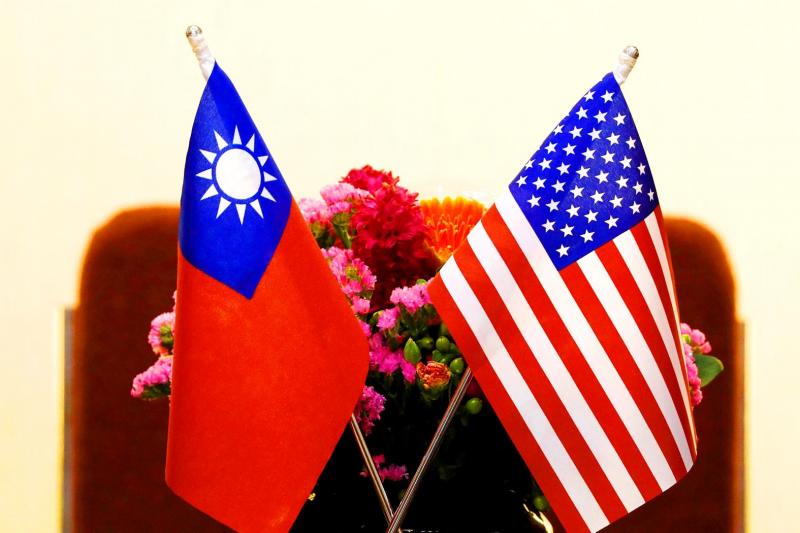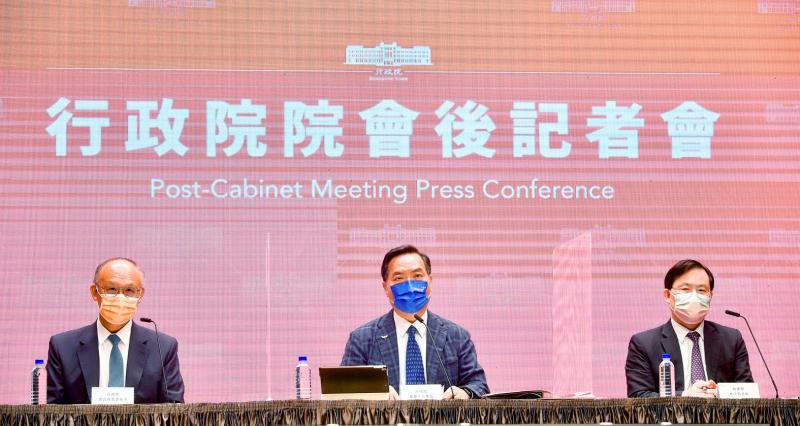Taiwan and the US have announced plans for trade talks in the early autumn in another step to boost ties.
The talks, dubbed the US-Taiwan Initiative on 21st-Century Trade, were unveiled on June 1 after US President Joe Biden launched the Indo-Pacific Economic Framework in May, a deal designed to counter China’s influence in the region, but did not feature Taipei despite more than 50 US senators urging Biden to include the nation.
The negotiations are to cover areas including agriculture, digital trade and regulatory practices, along with attempts to remove trade barriers, the Office of the US Trade Representative said in a statement on Wednesday.

Photo: Tyrone Siu, Reuters
The negotiations “will deepen our trade and investment relationship, advance mutual trade priorities based on shared values, and promote innovation and inclusive economic growth for our workers and businesses,” Deputy US Trade Representative Sarah Bianchi said.
“We plan to pursue an ambitious schedule for achieving high-standard commitments and meaningful outcomes covering the 11 trade areas in the negotiating mandate that will help build a fairer, more prosperous and resilient 21st-century economy,” she said.
Premier Su Tseng-chang (蘇貞昌) said the negotiations “symbolize a breakthrough between Taiwan and the US.”

Photo: George Tsorng, Taipei Times
The negotiations would open up an opportunity for Taiwan to attract funding and technologies from the US and other countries, the premier was quoted as saying by Executive Yuan spokesman Lo Ping-cheng (羅秉成) at a news conference following a weekly Cabinet meeting.
Environmental protection and labor rights are to be discussed, and could aid Taiwan’s bid to join the Comprehensive and Progressive Agreement for Trans-Pacific Partnership (CPTPP), Su said.
By seeking economic cooperation with the US, Taiwan would be ready to face economic threats from another nation, he added.
The negotiations could bring opportunities to export Taiwanese agricultural products, help small and medium-sized enterprises (SMEs) enter new markets, improve the country’s digital economy and increase service export, Su said.
He called on government agencies and the Executive Yuan’s Office of Trade Negotiations to sign bilateral agreements quickly.
The trade negotiation office yesterday said that the topics to be focused on would include trade facilitation, regulatory practices, anti-corruption measures, supporting SMEs in trade, agriculture, standards and regulations, harnessing the benefits of digital trade, promoting worker-centric trade, climate action, state-owned enterprises and nonmarket policies and practices.
The government would strive to improve Taiwan’s economic strength with the negotiations by boosting trade between the two sides, helping SMEs to enter the US market and improving Taiwan’s digital economy, the office said.
By strengthening investment and trade with the US, Taiwan hopes to increase the confidence of global investors in Taiwan, it said.
Signing trade agreements with the US might be beneficial for Taiwan to join the CPTPP and bring more opportunities for the country to deepen its economic ties with other countries, it said.
Cooperation between Taiwan and the US can strengthen the economy by helping Taiwan take action against nonmarket practices, it added.
“We welcome this opportunity to deepen economic collaboration between our two freedom-loving countries, while shaping a new model for trade cooperation in the Indo-Pacific,” the Ministry of Foreign Affairs wrote on Twitter.
Representative to the US Hsiao Bi-khim (蕭美琴) also wrote on Twitter: “We welcome this announcement, and Taiwan’s ready to start!”
However, Taiwan’s largest trading partner by far remains China, which said it firmly opposes the talks.
“China has always opposed any official exchanges between any country and the Taiwan region of China,” Chinese Ministry of Commerce spokespoerson Shu Jueting (束珏婷) said yesterday.
The US is urged to “carefully handle economic and trade relations with Taiwan and fully respect China’s core interests,” she said, adding that Beijing vows “all necessary measures to resolutely safeguard sovereignty, security and development interests.”

The CIA has a message for Chinese government officials worried about their place in Chinese President Xi Jinping’s (習近平) government: Come work with us. The agency released two Mandarin-language videos on social media on Thursday inviting disgruntled officials to contact the CIA. The recruitment videos posted on YouTube and X racked up more than 5 million views combined in their first day. The outreach comes as CIA Director John Ratcliffe has vowed to boost the agency’s use of intelligence from human sources and its focus on China, which has recently targeted US officials with its own espionage operations. The videos are “aimed at

STEADFAST FRIEND: The bills encourage increased Taiwan-US engagement and address China’s distortion of UN Resolution 2758 to isolate Taiwan internationally The Presidential Office yesterday thanked the US House of Representatives for unanimously passing two Taiwan-related bills highlighting its solid support for Taiwan’s democracy and global participation, and for deepening bilateral relations. One of the bills, the Taiwan Assurance Implementation Act, requires the US Department of State to periodically review its guidelines for engagement with Taiwan, and report to the US Congress on the guidelines and plans to lift self-imposed limitations on US-Taiwan engagement. The other bill is the Taiwan International Solidarity Act, which clarifies that UN Resolution 2758 does not address the issue of the representation of Taiwan or its people in

US Indo-Pacific Commander Admiral Samuel Paparo on Friday expressed concern over the rate at which China is diversifying its military exercises, the Financial Times (FT) reported on Saturday. “The rates of change on the depth and breadth of their exercises is the one non-linear effect that I’ve seen in the last year that wakes me up at night or keeps me up at night,” Paparo was quoted by FT as saying while attending the annual Sedona Forum at the McCain Institute in Arizona. Paparo also expressed concern over the speed with which China was expanding its military. While the US

SHIFT: Taiwan’s better-than-expected first-quarter GDP and signs of weakness in the US have driven global capital back to emerging markets, the central bank head said The central bank yesterday blamed market speculation for the steep rise in the local currency, and urged exporters and financial institutions to stay calm and stop panic sell-offs to avoid hurting their own profitability. The nation’s top monetary policymaker said that it would step in, if necessary, to maintain order and stability in the foreign exchange market. The remarks came as the NT dollar yesterday closed up NT$0.919 to NT$30.145 against the US dollar in Taipei trading, after rising as high as NT$29.59 in intraday trading. The local currency has surged 5.85 percent against the greenback over the past two sessions, central